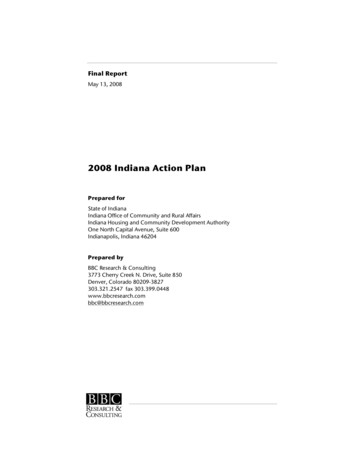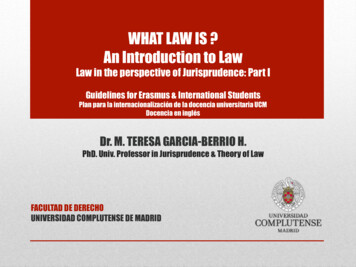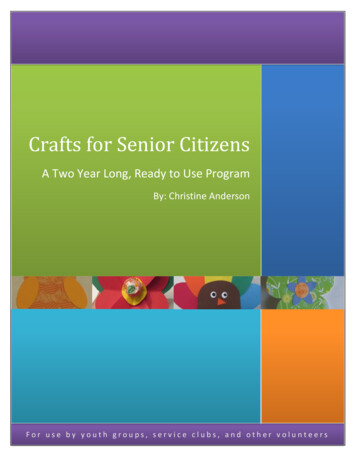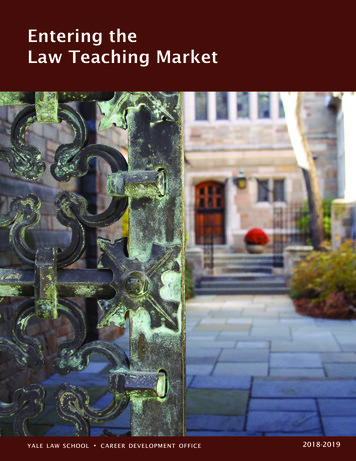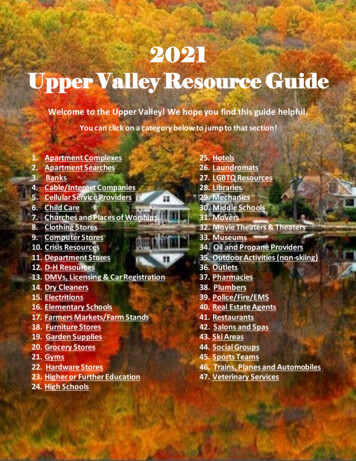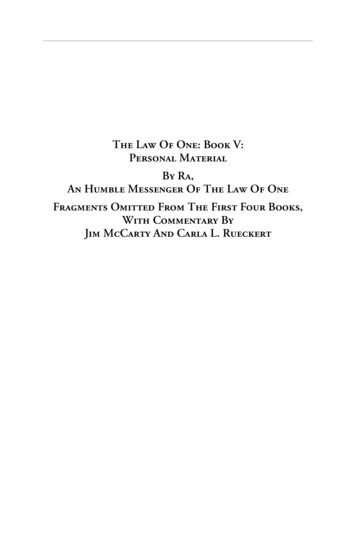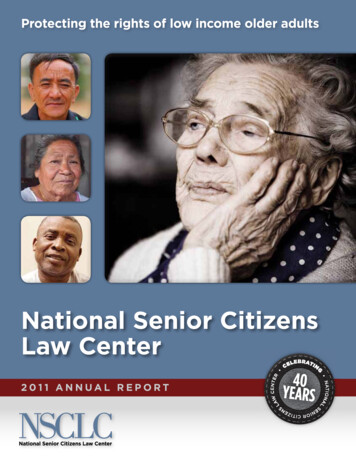
Transcription
National Senior CitizensLaw Center2011 ANNuAL RepoRt
2011 ANNuAL RepoRt N At i o N A L S e N i o R C i t i z e N S L Aw C e N t e RChair’s perspectiveAs Board Chair this past year, I have watchedwith great pride as the National SeniorCitizens Law Center impacted significant issuesaffecting low-income older adults. The elderlypoor and their advocates nationwide have nomore important championworking on their behalf.For the first time inits 40-year history, theorganization was recognized byPhilanthropedia, a division ofthe online charity informationservice GuideStar, as a 2011Top Non-Profit. NSCLC isoneof only 13 national agingRobert Johnsonorganizations recognized byexperts in the field for itsoutstanding work. This honor reflects well notonly on NSCLC’s effectiveness and impact, butalso on its stability and outstanding leadership.In addition, there were successes in each ofthe organization’s three priority issue areas. Hereare just some examples:nHealth Care: The U.S. Centers for Medicareand Medicaid Services looked to NSCLC forits expertise on the rights of dual eligibles andalso adopted, under pressure from our team,a final rule improving access to translatedmaterials for limited English proficientMedicare beneficiaries. Through litigation,the health team collaborated successfully withothers to save adult day health care servicesfrom the budget axe in California.nEconomic Security: NSCLC staff providedunique insight into the ongoing debatesabout the future of Social Security andSupplemental Security Income and succeededin securing class certification in Clark vAstrue, a case that restores Social Securityand SSI benefits to over 100,000 seniorsand people with disabilities who lost benefitsbecause of an illegal policy.nFederal Rights: The Federal Rights Projectstaff filed Supreme Court amicus briefs onseveral significant court access cases andplayed a major role in advocating for theconstitutionality of the Affordable Care Actin amicus briefs submitted to various federalcourts and as featured spokespeople in themedia and in public forums held across thecountry.NSCLC attorneys also continued to offerinformation, education and counsel to legalservices advocates from all over the countrythrough publications, webinars, phone andonline requests as well as presentations at manyconferences, seminars or forums.Over the past year, the board has expandedwith the addition of former U.S. Senator FredHarris, Center for American Progress PresidentNeera Tanden, and University of CaliforniaProfessor Carroll Estes. In addition, theboard added new Litigation and Public Policycommittees and strengthened its DevelopmentCommittee.NSCLC welcomed new DevelopmentDirector Noris Weiss-Malvey and BorchardLaw and Aging Fellow Evin Isaacson and,with heartfelt appreciation, said goodbyeto Development Director Lynda MartinMcCormick, Staff Attorney Gene Coffey andBorchard Fellow Rachel Frazier.NSCLC relies on the support of some ofAmerica’s leading foundations to help to fulfillits mission. Individual donors who understandthe importance of NSCLC’s work are also animportant source of support. The board andstaff are grateful to all those who continue torecognize the value and significance of thisorganization.Now more than ever we need anorganization like the National Senior CitizensLaw Center. Please join me in supportingNSCLC in 2012.2
N At i o N A L S e N i o R C i t i z e N S L Aw C e N t e R 2011 ANNuAL RepoRtexecutive Director’s Messageeven as the ranks of the nation’s elderly poorgrow and their needs for quality health careand economic security explode, the programsthey rely on are under constant attack.Cuts to dozens of needed state programsare already underway and many of the cutsare illegal. Cuts to Medicare, Medicaid, SocialSecurity and Supplemental Security Income(SSI) seem inevitable.Federal programs, the aging network andprivate insurance plans all fail to provide servicesthat are culturally and linguistically appropriate.The Supreme Court could soon decidewhether consumers have the right to sue stategovernments to obtain health care benefits.It could also decide to find the health reformlaw unconstitutional, which could have seriousrepercussions for seniors with limited incomeor resources.As I’ve said many times before, interestgroups in Washington and in state capitols havedozens of lawyers to represent them on issueslike these. The elderly poor need lawyers ontheir side too.In 2012, NSCLC will work, often incollaboration with other national legal andconsumer groups, to fight for strengthening,not cutting federal health and income securityprograms. With the National Committee toPreserve Social Security and Medicare andothers, for example, we will stand together insupport of Social Security. At the same time,we will seek to fix problems such as the brokenSSI appeals process and identify areas in whichseniors with limited income and resources couldbe better protected.As our health team did recently in joiningwith others to save the California Adult DayHealth Care Services program, we will fight tokeep such programs alive for the elderly poor.As states are encouragedto move dual eligibleindividuals (those with bothMedicare and Medicaid)into integrated care models,we will ensure strongconsumer protection forthem.In 2011, we achievedvictories on behalf of those with Paul Nathansonlimited English proficiency.We remain committed topromoting language access to benefits programsin 2012.NSCLC has a long history of opposingjudicial activism. In that tradition, the FederalRights Project continues its leading role infighting challenges to the health reform law thatare now before the Supreme Court. The Projecthas just submitted amicus briefs to the Courtrelated to the legality of the individual mandateand the doctrine of severability.This year, we begin a monthly Webinarseries as part of our ongoing effort to keep legalservices advocates in our networks informedand better able to advise and help their clients.The series, our newsletters, frequent health andincome network alerts as well as our new Website and regular one-on-one contacts all combineto educate and counsel those on the front lines.The need for strong advocacy on behalfof the elderly poor couldnot be more pressing.NSCLC, its partners inthe legal and agingfields and thousandsof dedicatedadvocates nationwideare bracing for achallenging year ahead.3
2011 ANNuAL RepoRt N At i o N A L S e N i o R C i t i z e N S L Aw C e N t e RHealth CareNSCLC ensures that low-income older adults understand and have access toaffordable health care benefits and that more people receive long-term careservices at home.To achieve its objectives, NSCLC’s healthteam regularly uses administrative advocacy,providing information, policy insight andguidance to federal and state agencies onemerging issues. NSCLC selectively employslitigation, often in collaboration with othernational or state-based consumer and legalorganizations.nProvided expert guidance to policymakersand advocates on how to improve carefor people with both Medicare andMedicaid (dual eligibles) in new integratedmodels. NSCLC published a series of fourissue briefs and held an equal number ofWebinars on the topics covered in them. InJuly, 80 policymakers, advocates and othersattended a NSCLC policy forum at the KaiserFamily Foundation in Washington, DC, thatspotlighted the need for consumer protection.nEnsured that insurance plans translatemore Medicare materials for those whohave limited English proficiency byenlisting a groundswell of comments toa proposed federal regulation. Urged byNSCLC to comment on a proposed federalregulation, nearly 150 consumers andadvocates nationwide responded and theresult was stronger rules for Medicare plansthat serve millions of people with limitedEnglish proficiency.in 2011, NSCLC:nPreserved access to adult day healthcare for 35,000 Medi-Cal beneficiaries,ensuring that older adults and peoplewith disabilities in California are notforced into nursing homes (Darling et alv Douglas). In June, NSCLC joined withother legal services lawyers and filed amotion in Federal court for a preliminaryinjunction to stop elimination of the AdultDay Health Care Program as a MediCal benefit. In November, we reached asettlement in the case which allowed manyto retain home and community-basedservices in a new state program.NSCLC hosted a policy forum on EnsuringConsumer Protection for Dual Eligibles atthe Kaiser Family Foundation in July. Panelistsat the Washington, DC event included (fromleft to right): Center for Medicare AdvocacyAttorney Patricia Nemore, NSCLC DeputyDirector Kevin Prindiville, Medicare MedicaidCoordination Office Director Melanie Bellaand SCAN Foundation President and CEOBruce Chernof.4
N At i o N A L S e N i o R C i t i z e N S L Aw C e N t e RnCreated interest and action related toLGBT older adults’ concerns about longterm care with the release of a landmarkreport and Web-based video stories basedon a Arcus Foundation-supported survey ofLGBT seniors, providers and other caregivers.As a result, a Kentucky philanthropic groupgave a grant to a nursing home ombudsmanagency to train staff to be more in tune withissues gay residents encounter. 2011 ANNuAL RepoRtissue to the leading funders of aging projects.Improving Language Access to Keep CaliforniaOlder Adults at Home; An Examination of theIn Home Supportive Services (IHSS) Program,funded by the California Endowment, wasreleased in February and generated muchdiscussion and debate in state policy circles.NSCLC also joined with other Californiaadvocates in seeking a preliminary injunction tostop cuts to the In-Home Supportive Services(IHSS) program. A federal judge issued theinjunction in early 2012.NSCLC HeLpSA Heartfelt thank You fromeskaton Adult DayHealth CenterBillie attends Eskaton five daysa week and would have requiredskilled nursing placementwithout the Adult Day HealthCare (ADHC) program. Billie’sdaughter was not going to beable to hold down her job and care for Billie athome if the center closed. According to EskatonADHC Administrator Jill Yungling, without thisunique program, many other participants wouldotherwise face premature entrance into a longterm care facility. Some 50 family, participantsand staff from Eskaton ADHC of Carmichael,California personally signed a thank you cardfor NSCLC’s work to save the state’s adult dayhealth care program.NSCLC co-sponsored a September My MedicaidMatters rally in the shadow of the U.S. Capitol.Here, former Staff Attorney Gene Coffey(kneeling) talks with other advocates.In a series of papers on Medicaid payment forassisted living, NSCLC explored several issuesincluding whether residents have a right to returnafter a hospitalization. At a Capitol Hill briefingin March, NSCLC’s Eric Carlson urged statesto enact more laws to protect assisted livingresidents and called for more federal oversight.The series was developed with support from theCommonwealth Fund.NSCLC made great strides in bringing seriousattention to language access issues. Early in theyear, NSCLC prepared a study on Medicare plansthat showed they were not posting translatedmaterials. In November, Executive DirectorPaul Nathanson moderated a panel convened byNSCLC at the Grantmakers in Aging nationalconference, highlighting the importance of the“ NSCLC knows the law inside and outin their specialties. They have a broadperspective on what is happening in otherstates that makes our cases stronger.”—Joelen Gates, Connecticut Legal Services5
2011 ANNuAL RepoRt N At i o N A L S e N i o R C i t i z e N S L Aw C e N t e Reconomic SecurityNSCLC seeks to preserve, strengthen, expand and improve access to programssuch as Social Security and Supplemental Security Income (SSI) that provideincome security to millions of older adults and people with disabilities.The income team uses administrative orlegislative advocacy to achieve its objectives,providing briefs, reports and information thatseek to improve income security programs.It effectively uses litigation to changeadministrative policies that have illegallyimpoverished many of the nation’s elderly.nEnsured that a larger nationwide classwas certified in an important SocialSecurity case. Some 100,000 people couldbe part of a nationwide class in NSCLC’ssuccessful challenge to the Social SecurityAdministration’s policy of suspending ordenying Social Security and SupplementalSecurity Income (SSI) benefits wheneversomeone had an outstanding warrant for analleged violation of probation or parole.nPublished a series of SSI policy issuebriefs and reports on how the programneeds drastic modernization and howprocesses such as appeals must be reformedto operate the program more effectively andresponsively. NSCLC also called for increasingthe resource limit and adjustments to increasethe Federal Benefit Rate from its currentsub-poverty level of 674 a month.in 2011, NSCLC:nReleased a widely discussed policy issuebrief on the Cost of Living Adjustment(COLA) that showed how the proposedchained CPI would adversely affectthose with low incomes. NSCLC’s analysisshowed coalition partners and policymakershow the change would hurt beneficiaries,calling a chained CPI a “stealth benefit cut.”It proposed the Experimental Price Index forthe Elderly (CPI-E) as an alternative.“We rely on a national organization likeNSCLC for cutting edge informationon cases like that of [Tony] Gonzalesand how to take appropriate action onbehalf of our clients.”—Ellen Mendoza, Legal Aid Services of Oregon.Gonzales participated as a plaintiffin the Clark v Astrue case.NSCLC Executive Director Paul Nathansonmoderated a panel on language access thatincluded Global Policy Solutions President andCEO Maya Rockeymore at the 2011 Grantmakersin Aging Conference.6
N At i o N A L S e N i o R C i t i z e N S L Aw C e N t e RnPlayed a key role in the fight to keep SSIfor elderly refugees who lost their benefitsbecause of Congressional indifference.While the issue is still pending, NSCLC incollaboration with other advocates, was ableto garner Senate support to continue benefitsfor some 5,000 older adults. The bill remainsstalled in the House. 2011 ANNuAL RepoRt“It’s important to have ground troops,but you need someone who is expertand responds quickly to your questions.Thank goodness for NSCLC.”—Megan Wall, St. John’s County Legal AidWith the assistance of Borchard Fellow RachelFrazier, NSCLC’s Gerald McIntyre produceda number of policy issue briefs and reportson Social Security and SSI that were used byadvocates who participated with NSCLC in theStrengthen Social Security campaign sponsoredby Social Security Works.NSCLC HeLpStony GonzalesTony Gonzales, a full-blood Apachefrom New Mexico, grew up in anorphanage and with his mother, untilhe dropped out of high school. Hemade his way to California and fellinto a criminal life. In 1988, he wassentenced to Federal prison for sevenyears. When he was released, he went toschool and worked as a welder and thenas a drafter. However, after he retired,a 1965 warrant from his first run-inwith the law for “joy-riding” causedhim to lose his Social Security benefits.“The record was so old, no one knew itexisted,” said Attorney Ellen Mendozaof Legal Aid Services of Oregon. “Hehad gone from being a bad guy to agood guy and then got a kick in thegut.” Gonzales, who was a plaintiff inthe Clark v Astrue case that NSCLCand several others successfully arguedin the U.S. Court of Appeals (2ndCircuit), saw his benefits reinstated.7
2011 ANNuAL RepoRt N At i o N A L S e N i o R C i t i z e N S L Aw C e N t e RFederal RightsNSCLC has a long history of opposing judicial activism and keeping the courtsopen for justice. In that tradition, the Federal Rights Project continues itsleading role in fighting serious and potentially dangerous challenges to thehealth reform law in the courts.in 2011, the project:nnnFought for the constitutionality of theAffordable Care Act through speaking outin public forums, in blogs and articles andin the national media. Policy Counsel SimonLazarus debated other leading experts on theissue at the Brookings Institution, GeorgeMason University Law School and at forumsin Denver, CO and elsewhere. He wroteseveral blogs for the American ConstitutionalSociety (ACS) and Slate and articles for theNational Law Review and Ohio State LawReview and was quoted frequently in The NewRepublic, Politico, The Hill and other nationalnews media throughout the year. In addition,NSCLC drafted and filed several amicus briefson the health reform law as the cases in thestates worked their way to the Supreme Court.Ensured that a state agency can bringsuit in Federal court in a victory for thesupremacy of federal law. The case involvedwhether a state agency, the Virginia Officefor Protection and Advocacy (VOPA), couldbring suit to compel state officials in charge ofstate-run mental hospitals to release medicalrecords for an investigation into possibleabuse and neglect. Bobroff was lead authorand counsel of record for the amicus briefjoined by AARP and other groups.The Project also filed an amicus brief inCompuCredit v Greenwood. The Supreme Courtwas asked to overturn a 9th Circuit decisionsupporting the plaintiff’s right to sue a creditrepair organization. The organization arguedthat consumers only have a right to arbitration,not to sue and that the statutory requirement tonotify consumers of their right to sue does notnecessarily convey the right.In another “friend of the court brief”(Center for Special Needs Trust Administrationv Olson), NSCLC and AARP asked a federalappeals court to strike down South Dakota’sMedicaid eligibility changes on the groundsthat its Department of Human Services did notfollow federal law that is designed to provideopportunity to comment on proposed changes.Instead of issuing regulations,the Centers for Medicareand Medicaid Services reliedon a letter to set policy thatexcluded people over age65 from benefits.Defended the right of Medicaidbeneficiaries to use the courts to challengeillegal benefit cuts in a case heard by theSupreme Court in October (Douglas v ILC).Directing Attorney Rochelle Bobroff workedwith attorneys handling the appeal and alsoauthored blogs for the ACS and was quoted inmedia articles on the case saying that the Court“could shut courthouse doors to the poor.”8
N At i o N A L S e N i o R C i t i z e N S L Aw C e N t e R 2011 ANNuAL RepoRtFinancialsIn the fiscal year ended on June 30, 2011, NSCLC received revenue amountingto 2,716,134 and incurred expenses amounting to 2,131,734, resulting innet income of 584,400. Temporarily restricted net assets, which representgrant funds received to support programs in future fiscal years, increasedby 747,126, to a total of 1,650,128. Unrestricted net assets decreasedby 162,727, to a total of 177,070. Total net assets at the end of the yearamounted to 1,827,198.Private foundation and government grantscontinued to be the principal support forNSCLC’s programs, providing 89% of totalrevenue. Contributions, publication sales,attorneys fees, and other income provided theother 11% of total revenue.Program services as a whole comprised 84% ofNSCLC’s expenditures; management and generalexpenses 8%; and development expenses 8%.Full audited financial statements for fiscal year2011 with comparisons to 2010 are available onNSCLC’s Web site.FY2011 Revenues By CategoryFY2011 expenses By CategoryOther ProgramIncomeContributionsManagement s FoundationGrants &Contracts58%Income SecurityPrograms13%72%9
2011 ANNuAL RepoRt N At i o N A L S e N i o R C i t i z e N S L Aw C e N t e RSupportersThe National Senior Citizens Law Center Board of Directors and staff expresstheir sincere thanks to those who fund the work we do. 750,000 and above 5,000 and above 500 and aboveThe Atlantic PhilanthropiesAnonymousC. David AndersonRuth Arnhold Endowment Fundat the East Bay CommunityFoundationLeslie D. BramWilliam and Jeanne BarulichLouis H. CarpenterCombined Federal CampaignThe Elder & Disability LawCenter 100,000 and aboveAdministration on Aging, U.S.Department of Health andHuman ServicesOpen Society InstituteThe SCAN FoundationState of California IOLTAProgram and Equal AccessFund 50,000 and aboveThe Advocacy FundAlbert and Elaine BorchardCenter on Law and AgingThe California WellnessFoundationThe Commonwealth FundThe Nathan CummingsFoundation Inc. 10,000 and aboveBet Tzedek Legal ServicesLos AngelesRobert K. and Marilyn M.JohnsonMunger, Tolles & Olson LLPIndependence FoundationEric M. Carlson and GracielaMartinezJoseph & Jacqueline KirshbaumMemorial Fund of the LibertyHill Foundation/Barry andPaula LittPhyllis Holmen 2,500 and aboveTeresa Bryce BazemoreJohn A. and Dianne C.PrindivilleThe Lois and Irving BlumFoundation Inc.Southern California Council ofElder Law AttorneysStephen R. BruceNina and Tim ZagatDavid J. CallardDavid H. FryMichael J. KellyNaomi and Stuart PaleyRuth Leys and Michael FriedElizabeth K. MoserPaul S. Nathanson 250 and aboveAnonymousRobert AdlerEdward D. SpurgeonCarlos A. Arcos LawCorporationVenable Foundation, Inc.Mr. and Mrs. Aaron Barulich 1,000 and aboveBoyer & Jackson, P.A.AFSCMEDeborah Winston CallardSen. Fred R. HarrisCenter for MedicareAdvocacy, Inc.Wythe HoltHannah and Steven LiebermanMiddle Road FoundationJack K. and Rebecca C. MorganRadian Group Inc.Carol and Stuart Zimring10Lucy and David EisenbergPeter and Cynthia EllisJeffrey M. and Renee C. EpsteinCarroll L. Estes
N At i o N A L S e N i o R C i t i z e N S L Aw C e N t e RMitchell T. Kaplan and MarilynJones FundJason D. KoganKathy and Louis KravitzJoseph and Sandra LeeLiving TrustMargolis & Bloom LLPGerald A. McIntyreMichael PrindivilleJohn B. and Susan B. PowellWendy-Sue Rosen andTom FreemanBarbara B. and James L. SheaE. Percil StanfordAlan and Julie Van EgmondSteve and Linda Weitz 2011 ANNuAL RepoRtMiriam HarmatzMaryann McCormickLaw Office of David J. Hoey,Inc.Scott ParkinEdward F. and Eleanor H.HowardLauren SaundersKatharine Hsiao andAugustine BauHernández-Stern Family Fundof the California CommunityFoundationEmily Jenny and ChrisKaufmannDave RichSarah ShenaDeborah H. Thomson andJames E. BreslauerUnited Way of Southeastern PAAlan WassermanThe Erica F. Wood RevocableTrustBrian C. KellySteve KristovichTheodore KroeberMichael and Nora Jean LevinBrian W. LindbergBoard of DirectorsRobert K. Johnson,Chair 100 and aboveNoris Weiss MalveyAnonymousDouglas B. NobleDavid AffeldtJudith R. PachtJonathan AsherE.K. Pennington and L.J. LardyPaul J. and Donna E. BarulichJanice PenningtonBrad and Claire BrianRené ReixachPaul Nathanson,Ex Officio & SecretaryGeorgia Burke and David LuAllan RodgersTeresa A. Bryce BazemoreAlan Cohen and KarenKaplowitzErica and Doug RosenthalCarroll EstesRobert A. RussellBryson L. and Cynthia E. CookGabrielle M. SpiegelDavid FryGill DefordStephen SugarmanLucille Des JardinsKeith D. WisbaumT. Daniel Frith, IIINadia GareebWilliam and Maria R. GeerRonald and Barbara GeorgeGoldfarb Abrandt Salzman &KutzinH. Amos GoodallTom and Kathy Hamerup to 100Barrett S. Litt,Vice ChairSen. Fred HarrisPhyllis J. HolmenMichael J. KellyHannah LiebermanAnonymousKenneth and Susan AbrahamEdward D. SpurgeonCourtney S. BryantE. Percil StanfordDennis K. Frick and CrystalFrancisNeera TandenAnne B. and George GingoldDouglas M. Magee and AnneMarie Regan11Stuart D. Zimring
StaffA D M i N i S t R At i o NPaul Nathanson, Executive DirectorKevin Prindiville, Deputy DirectorNoris Weiss Malvey, Development DirectorScott Parkin, Communications DirectorTom Smith, Finance and Administration DirectorNancy Arevalo, Public Interest Law AssistantKuku Smith, Administrative AssistantEvin Isaacson, Borchard Law and Aging FellowAt t o R N e Y SRochelle Bobroff, Directing AttorneyGeorgia Burke, Co-Directing AttorneyEric Carlson, Directing AttorneyKatharine Hsiao, Co-Directing AttorneySimon Lazarus, Policy CounselGerald McIntyre, Directing AttorneyAnna Rich, Staff Attorneywww.NSCLC.oRG1444 Eye St., NW, Suite 1100 Washington, DC 20005 (202) 289-6976 (202) 289-7224 Fax3701 Wilshire Blvd., Suite 750 Los Angeles, CA 90010 (213) 639-0930 (213) 639-0934 Fax1330 Broadway, Suite 525 Oakland, CA 94612 (510) 663-1055 (510) 663-1051 Fax
Robert Johnson. 3 2011 ANNu AL RepoR t NA tioNAL SeN ioR CitizeNS LA w CeN teR . NAtioNAL SeN ioR CitizeNS LA w CeN teR 2011 ANNu AL RepoRt executive Director's Message e ven as the ranks of the nation's elderly poor grow and their needs for quality health care . Here, former Staff Attorney Gene Coffey (kneeling) talks with .



